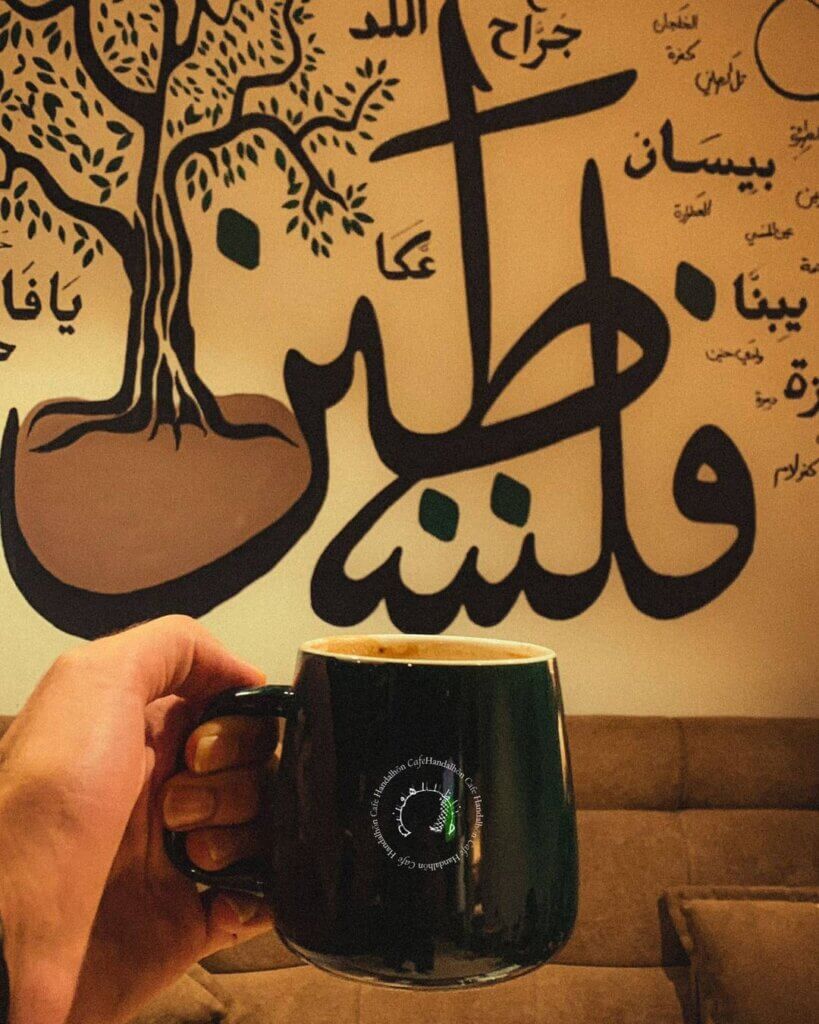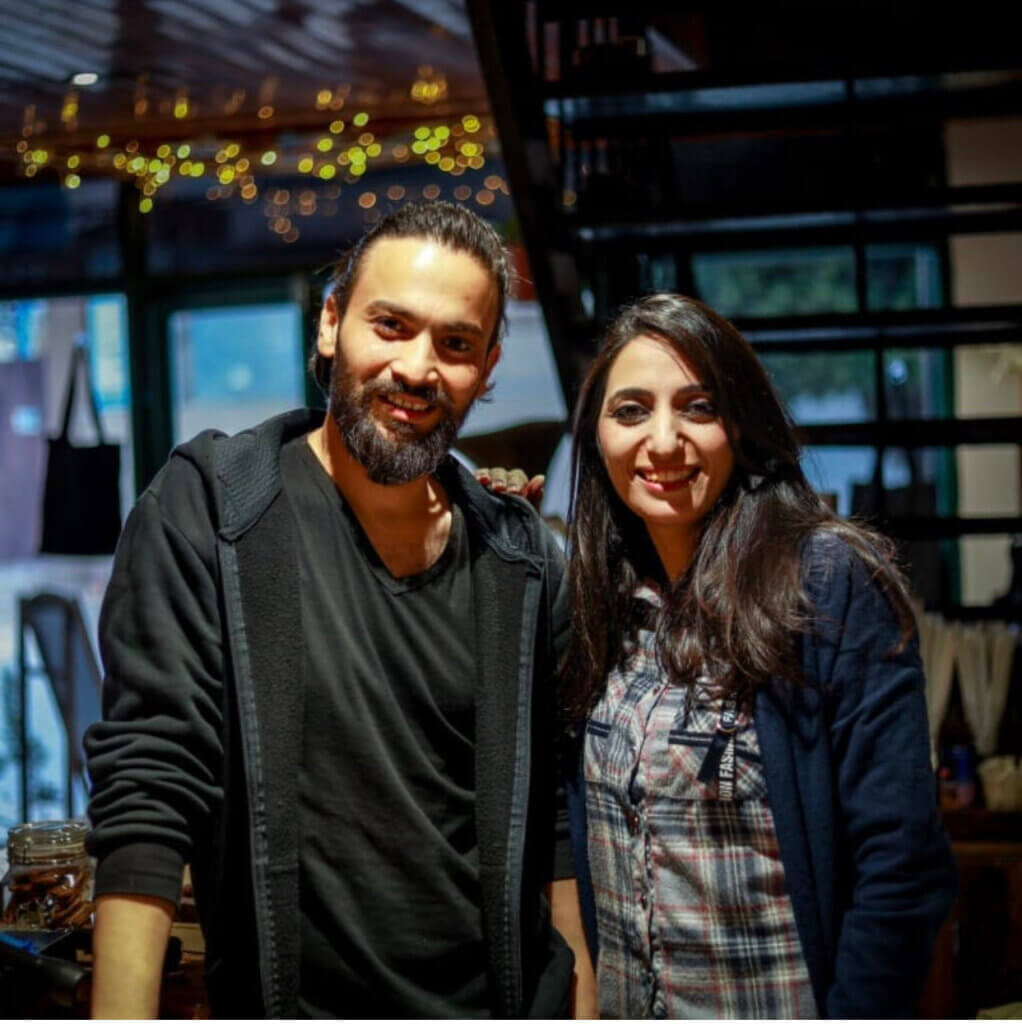Ragheed and Rana Moharm, along with their little eight-year-old daughter Tulip, decided to open a small cultural salon and café in the Gaza Strip named Handl Hon, which means “we will stay here.”
Ragheed, 35, is one of the Palestinian refugees who still have faith in returning to his family lands in Jaffa, which was occupied by the Israeli occupation in 1948.
He is committed to staying in Gaza even though all of his relatives are in Europe.
“I got many invitations from my relatives in Europe, Brazil, UAE, and Sweden, yet I chose to stay in Gaza,” Ragheed told me. “Even with the hard life here due to the bad economic situation and the PTSD of wars, it’s still our Palestine.”
Ragheed says he doesn’t love Palestine more than the Palestinians who live abroad, it’s just that those who left could not live amid the Israeli wars and restrictions. Instead of running away from the pressure of living in the Gaza Strip, which is under the suffocating siege by Israel, he prefers to stay in Gaza.
Ragheed worked as a receptionist in a hotel in Gaza for more than 15 years. In September 2020, he quit because of the lack of guests due to the Covid-19 crisis.
Ragheed opened “Handl Hon” on Wehda street in the middle of Gaza on November 15, the same date as the Palestinian independence day. “I chose to open the cafe on that day because it means a lot to me and all Palestinians,” he said.

The small cafe is full of details. The walls of the cafe are adorned with photos of many Palestinian authors and artists such as Edward Said and Mahmoud Darwish. There are books and novels for Arab and foreign writers in every corner of the place, giving the patrons a chance to read. In addition to the classical music that is on all the time in the cafe, there are also musical instruments like an Oud and violin in the cafe if any of the guests would play music.
The cafe serves delicious hot and cold coffee drinks at reasonable prices, which are also affordable for all of Gaza’s people.
The little cultural salon is always full of young and old musicians, actors, writers, photographers, and Gazans who enjoy their coffee time getting in touch, reading books, working on their laptops, playing music, or singing heritage songs.
“As a freelance translator, I find Handl Hon the best cafe for me to escape from the noise of my house,” Basma, 24, one of the cafe patrons told me smiling. “I work on my laptop while drinking the most pleasant tasting cup of cappuccino made by Ragheed.”
“Listening to Fairouz, ‘a famous Arab singer’, I always enjoy the morning cup of tea with Ragheed every day,” Yehia, 30, an Oud musician, told me about the cafe.

Rana, Ragheed’s wife, is an administrative officer in a musical organization in Gaza. After work, she finishes her day in the cafe.
“Even with the precious chances of a better life outside Palestine, I always agreed with Ragheed to stay here,” Rana told me.
“As Ragheed and I built Handl Hon by our own hands, we will build our home in Jaffa,” Rana added.
Ragheed’s father was from Jaffa, and he used to tell Ragheed about Jaffa, Haifa, Lod, Tiberias, Ramla, Tiba, and the other occupied Palestinian countries and villages.
“Ezz, my father, told me about orange farming in Jaffa, which was popular in exporting citrus through Jaffa port to the whole world,” Ragheed told me.
He showed me many photos from his fathers’ photo album for Jaffa port, the Palestinian transport buses moved freely between Palestinian cities, and he showed me the Gaza train, which was connected between Egypt and Gaza.
“Ezz gave me his special photo album. He also gave me our land title document; I promised him to keep it until we return.”
When Palestinians were forced to leave their lands in 1948 they assumed they would return. So, many Palestinians took only their homes’ keys and land title documents because they were afraid they would be stolen.
Palestinians didn’t assume that the occupation intended to steal their land forever.
The dream of returning is in Palestinian’s minds at all times. “For me, “Handl Hon” is not just a name, but a message,” Ragheed said when I asked him about the name. He added, “it’s a message from me to my little Tulip that we have a home and we will return to it.”
Most Palestinians hope to pray in Jerusalem, celebrate in Bethlehem, eat knafeh in Nablus, sit on the beach in Akka, harvest olives in Nablus, and watch glass factories in Hebron. Most Palestinians hope to sleep without thinking that they will be a target, or that their homes will be stolen at any time for no reason.
All Palestinian refugees feel homesick for their own homes and lands. They pass their nostalgia and homesickness to their children, and their children will pass it to theirs.
Ragheed not only wants his little Tulip to grow up with the understanding that she belongs to Palestine, but that all Palestinians do.
Ragheed summed it as he looked at his father’s picture. He said “my father was the past,” then he put his hand on his chest and said, “I’m the present,” then he put his hand on his little girl’s head and said, “and she is the future.”
Ahmed Dremly
Ahmed Dremly is a creative writer and translator from the Gaza Strip. Follow him on Twitter at @ahmedhodremly.
BEFORE YOU GO – Stories like the one you just read are the result of years of efforts by campaigners and media like us who support them by getting the word out, slowly but doggedly.
That’s no accident. Our work has helped create breakthroughs in how the general public understands the Palestinian freedom struggle.
Mondoweiss plays a key role in helping to shift the narrative around Palestine. Will you give so we can keep telling the stories in 2022 that will be changing the world in 2023, 2025 and 2030?
Related posts:
Views: 0
 RSS Feed
RSS Feed

















 January 14th, 2022
January 14th, 2022  Awake Goy
Awake Goy  Posted in
Posted in  Tags:
Tags: 
















